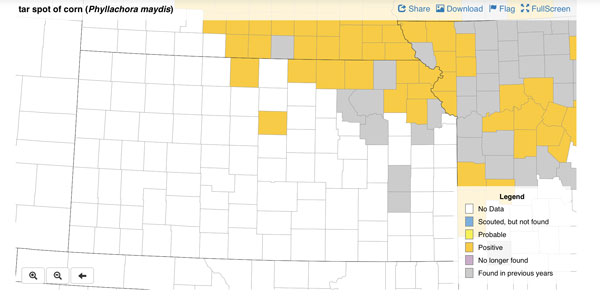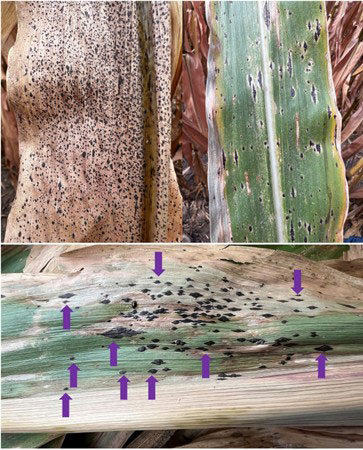Tar spot of corn, a disease caused by the fungus Phyllachora maydis, has now been confirmed in Doniphan (6/11), Brown (6/17), Jefferson (6/25), Atchison (7/2), Jackson (7/15), Republic (7/7), Marshall (7/9), Washington (7/25), Lincoln (10/10), and Smith (10/16) counties (Figure 1). Tar spot was first detected in Kansas in 2022, late in the season (9/15/2022).
Prior to harvest, it is crucial to identify fields with tar spot, as these locations may be at a higher risk for the disease next year. Producers should consider selecting hybrids tolerant to tar spot disease for the 2026 corn season.

Figure 1. Tar Spot of Corn (Phyllachora maydis) in Kansas and border counties as of October 16, 2025. Source: https://kscorn.com/corndisease/#TarSpotMap
What am I scouting for?
Tar spot develops as small, black, raised spots (circular or oval) on infected plants, which may appear on one or both sides of the leaves, leaf sheaths, and husks. Spots may be found on healthy (green) and dying (brown) tissue. Tar spot can be easily confused with insect poop, which can appear as black spots on the leaf's surface (Figure 2). For assistance in confirming tar spot, please contact your local county extension office or the K-State Plant Disease Diagnostic Lab at https://www.plantpath.k-state.edu/extension/plant-disease-diagnostic-lab/.

Figure 2. Tar Spot of Corn. Purple arrows are indicating a few of the tar spot lesions. Photos courtesy of Rodrigo Onofre, Department of Plant Pathology, K-State Research and Extension.
Is there a history of disease in this field or neighboring fields?
Tar spot overwinters on infested corn residue on the soil surface, which serves as a source of inoculum for the subsequent growing season. Spores can be dispersed by wind and rain splash and can move to nearby fields if conditions are favorable.
Help track tar spot in Kansas
Please help us track tar spot. You can contact me (785-477-0171) directly if you suspect a field has tar spot and/or submit a sample to the K-State Plant Disease Diagnostic Lab at https://www.plantpath.k-state.edu/extension/diagnostic-lab/documents/2021_PP_DiseaseLabChecksheet.pdf.pdf. This will help us monitor the situation in the state.
Rodrigo Onofre, Row Crop Plant Pathologist
onofre@ksu.edu